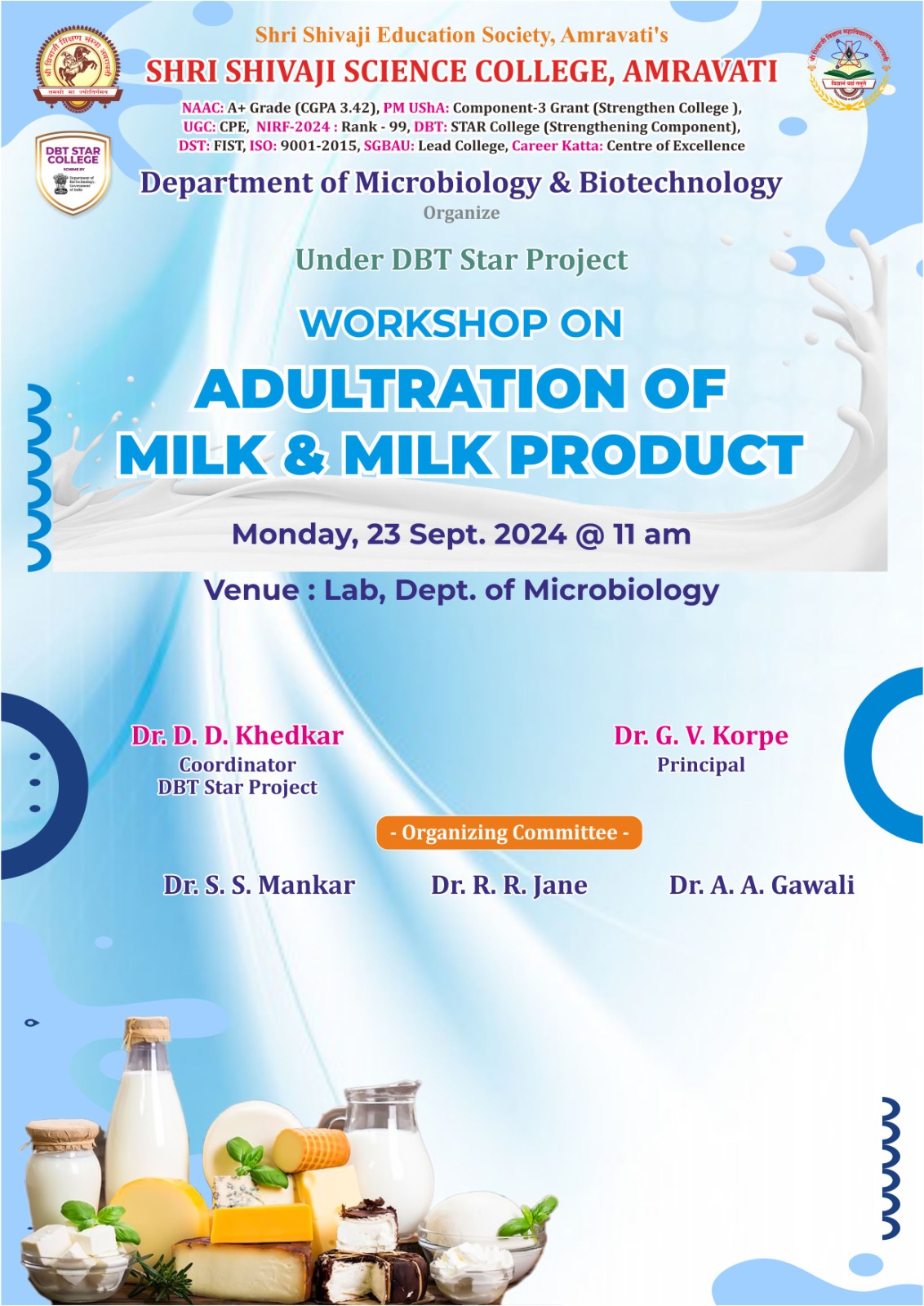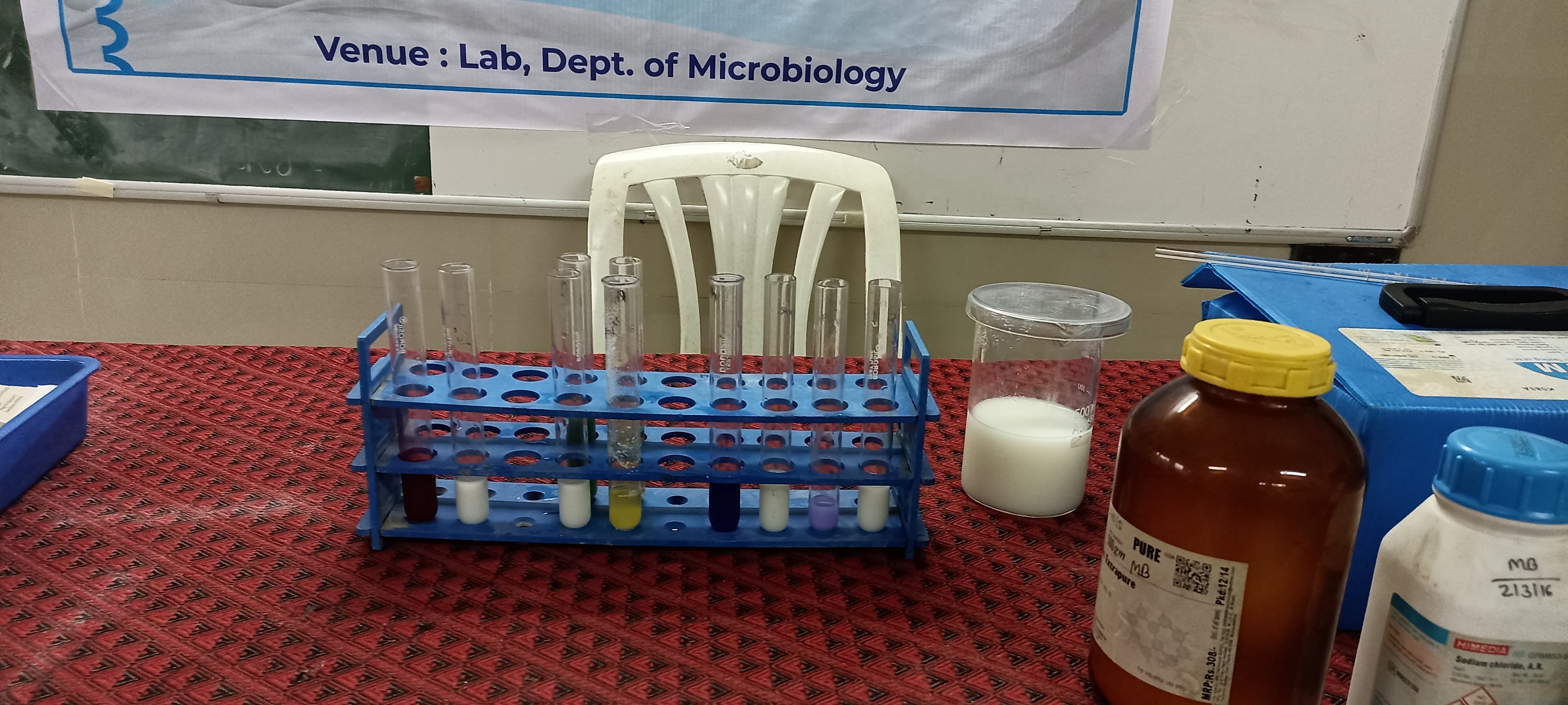SHRI SHIVAJI SCIENCE COLLEGE, AMRAVATI
DBT STAR COLLEGE PROJECT ACTIVITY
ACTIVITY REPORT

Workshop on Adulteration of Milk and Milk Products
Activity Dates: 23/09/2024
Type of Activity: Students Workshop
Organizing Department: Department of Microbiology
Program Coordinators: Ms. Suwarna Mankar, Dr. Rasika Jane, Dr. Ashruta Gawali
Head of the Department: Dr. D. D. Khedkar
External Collaborator (if any): Nil
Objectives:
- 1. Hands-on Learning: To provide practical exposure to the techniques used for the detection of adulterants in milk and milk products.
- 2. Awareness Creation: To raise awareness among students about the widespread issue of milk adulteration and its impact on health.
- 3. Food Safety Education: To understand the importance of maintaining food safety standards and how microbiology plays a vital role in detecting adulteration.
- 4. Critical Analysis: To train students to critically analyze food samples and equip them with skills that would be beneficial in their future careers as microbiologists.
- 5.Understanding Food Adulteration: To impart knowledge about the various types of adulteration in milk and milk products, how they affect the quality of the product, and the potential health hazards associated with it.
No of Beneficieries: 75
Classes Involved: B.Sc III And B.Sc II Microbiology students
Venue of the Activity: Department Laboratory
Activity Report:
Adulteration of food products, particularly milk and dairy, has become a growing concern globally. Milk is considered a complete food, rich in essential nutrients such as proteins, fats, vitamins, and minerals. However, due to its high demand, it is often subject to adulteration, compromising not only the quality of the product but also posing serious health risks. With the increasing awareness of food safety, the Department of Microbiology and Biotechnology recognized the need for students to understand the dynamics of food adulteration, specifically in milk and milk products. This led to the organization of an experimental workshop on 23rd September 2024, designed to empower students with hands-on skills and theoretical knowledge on detecting milk adulteration.
The workshop was targeted toward the final-year undergraduate students of the B.Sc. Microbiology program, aiming to bridge the gap between theoretical knowledge and practical applications.
Objectives of the Workshop
1. Understanding Food Adulteration: To impart knowledge about the various types of adulteration in milk and milk products, how they affect the quality of the product, and the potential health hazards associated with it.
2. Practical Skill Development: To provide students with hands-on experience in detecting common adulterants in milk such as water, starch, detergent, urea, and synthetic milk, using simple laboratory techniques.
3. Legal and Health Implications: To make students aware of the laws and regulations in India governing food adulteration, including the Prevention of Food Adulteration (PFA) Act and Food Safety and Standards Authority of India (FSSAI) guidelines.
4. Encouraging Scientific Thinking: To develop critical thinking and problem-solving skills among students, enabling them to identify adulterated food products and propose methods to ensure food safety.
Workshop Overview
The workshop began at 10:00 am, with students eagerly gathering in the laboratory. The session started with a welcome address by Ms. Suwarna Mankar, who highlighted the significance of food safety in today’s world and the alarming rise in milk adulteration cases. She emphasized the importance of microbiologists being on the frontline of food safety protocols, equipped with the knowledge and skills to identify adulterated food products.
Following the introduction, Dr. Rasika Jane took over the theoretical session, delivering a detailed lecture on the different forms of adulteration found in milk and its products. She covered a range of topics from common adulterants and their effects on human health to the technical aspects of testing for these substances. Dr. Jane also drew attention to some infamous cases of food adulteration in India, which resulted in serious health hazards and legal actions.
Dr. Ashruta Gawali, who has extensive expertise in the food microbiology domain, led the practical component of the workshop. The students were divided into groups, each assigned the task of testing different samples of milk and milk products for specific adulterants. The hands-on session involved the use of chemical and physical tests to detect common adulterants such as:
Water: Detected by the lactometer test, which measures the specific gravity of milk. Pure milk has a standard specific gravity, and any dilution with water changes this value.
Starch: Tested using an iodine solution. The presence of starch in milk gives a blue-black coloration, indicating adulteration.
Detergents: The presence of detergents in milk was identified using a foaming test. A detergent-laced sample produces foam when shaken.
Urea: Urea is a harmful adulterant that mimics proteins in milk. The test for urea involved a reagent that changes color if urea is present in the sample.
Synthetic Milk: Students were taught how synthetic milk can be made to look and taste like genuine milk but lacks the nutritional benefits. Detection was done through simple organoleptic tests and chemical reagents.
Each group was provided with multiple samples, some adulterated and some pure, and they were tasked with identifying the adulterated ones using the methods taught.
Key Learnings and Scientific Insights
The workshop provided the students with critical scientific insights into the real-world challenges posed by food adulteration, particularly in milk. Some of the key learnings from the session were:
1. Practical Experience: Students gained hands-on experience in conducting laboratory tests to detect various adulterants. The step-by-step procedures gave them confidence in performing these tests independently.
2. Awareness of Health Risks: The adulteration of milk poses severe health risks, including gastrointestinal problems, kidney damage, and even cancer in the long term. Students learned how even small amounts of these adulterants, when consumed over a period, could lead to chronic diseases.
3. Understanding the Complexity of Adulteration: The adulteration of milk is not limited to water dilution. Complex adulterants like synthetic milk and urea are used to increase the quantity of milk, thus making detection difficult without specific tests. This helped students appreciate the complexity of food adulteration detection and the need for vigilance.
4. Linking Theory to Practice: The workshop successfully linked theoretical knowledge from their microbiology coursework to practical laboratory work. Concepts such as the role of microorganisms in food safety and the use of microbial techniques in quality control were emphasized.
Contributions of the Organizing Team
The success of this workshop was largely due to the dedicated efforts of the faculty members of the Department of Microbiology and Biotechnology.
Ms. Suwarna Mankar, the key coordinator of the workshop, meticulously planned the entire event, from the procurement of samples and reagents to the arrangement of laboratory space and equipment. Her efforts ensured the smooth conduct of both the theoretical and practical sessions.
Dr. Rasika Jane delivered an informative and engaging lecture on food adulteration and its detection. Her deep knowledge of the subject and ability to simplify complex scientific concepts for the students made her session invaluable.
Dr. Ashruta Gawali led the practical sessions with enthusiasm, patiently guiding the students through the testing procedures and ensuring that they understood the scientific rationale behind each step.
Impact of the Workshop
The workshop left a lasting impact on the students, equipping them with not only the technical skills required to detect adulterated milk but also the awareness needed to be responsible consumers and professionals. Several students expressed their appreciation for the hands-on nature of the workshop, which allowed them to apply the concepts they had learned in theory classes in a practical setting.
Moreover, the workshop underscored the important role microbiologists play in ensuring food safety and public health. With food adulteration being a significant public health issue in India, the students realized the relevance of their field of study in addressing real-world problems.
Conclusion
Outcomes:
- 1. Enhanced practical skills
- 2. Increased awareness of food safety
- 3. Critical thinking and problem solving skills
- 4. Understanding legal and regulatory framework
- 5. Preparedness for future careers
Photos:
 Students assembled for workshop |  Reagents for adulteration test |
 Demonstration of various milk test as per the protocol |  Result for various tests |
 Adulteration Reagents |  Preperationforworkshop |
Attendance Sheet:
 |
 |
 |